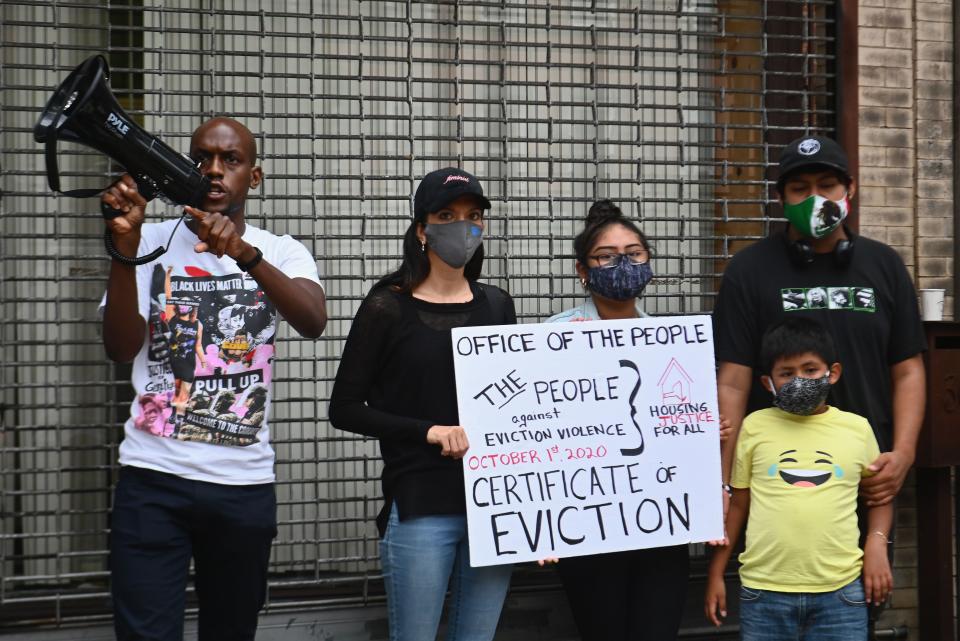Coronavirus: Trump administration attempts to prevent evictions using CDC quarantine authority
The Trump Administration will use the Centers for Disease Control and Prevention’s authority to halt evictions for a broad swath of American renters for the rest of the year, citing a “compelling case” to help stop the spread of COVID-19.
The move goes beyond who was covered under the CARES Act, which was restricted to rental residences backed by federally-backed, single-family mortgages. Between 30 million and 40 million Americans remain at risk of losing their homes in the next few months after a federal eviction moratorium expired on July 24.
The moratorium requires more proof of need from renters and past-due rent must be repaid after 2020, according to senior White House officials. Questions also remain whether the administration has the authority to direct the move.
“The CDC has made a compelling case that it is problematic at this time [and] homes have been the focal point,” a senior White House official said. “If people get kicked out they might get put in overcrowded congregate facility centers, and that is why CDC has taken steps and is very much in authority.”

Who qualifies?
The following cohort of Americans qualify for rent deferral until December 31, according to a senior White House Administration official on Tuesday:
American renters earning $99,000 or less,
Joint tax filers who make less than $198,000,
And those who received a coronavirus stimulus check.
Additionally, renters must demonstrate they will become homeless if evicted. They also must first try to obtain government rental assistance and declare on a form on the CDC website that they can’t pay rent due to a coronavirus-related hardship.
Experts: Not sure how this is enforceable
Questions remain whether the administration has the legal authority to do this, legal experts warned.
“Not sure how this law can be enacted through an executive order. Not sure how the prevention of evictions prevents the spread of communicable diseases. Not even sure how the federal government can control the eviction process, which is governed typically by state statutes,” said Scott Behren, an attorney at Behren Law Firm. “Again, I think it would be a thing for renters if enforceable, just not sure it’s enforceable.”
The moves follow President Trump’s executive order in August on evictions, directing several federal agencies to explore solutions to the looming eviction crisis. There’s still been no action from the Treasury secretary or the Secretary of Housing and Urban Development to identify financial assistance for struggling homeowners as the order directed.

The Federal Housing Finance agencies extended their own foreclosure and eviction moratorium until December 31, but that only applies to homeowners of single-family mortgages backed by Fannie Mae and Freddie Mac.
Several states have also extended their own eviction moratoriums to help renters.
On Tuesday, Florida Gov. Ron DeSantis extended the moratorium deadline on residential evictions until October 1 and Gov. Kate Brown of Oregon extended the state’s moratorium till December 31. New York State Chief Administrative Judge Lawrence Marks recently mandated that no residential eviction warrants can be executed until October.
In the meantime, state and local governments will still have authority to designate the $150 billion made available by the Department of Treasury earlier this year.
Dhara is a reporter Yahoo Money and Cashay. Follow her on Twitter at @Dsinghx.
Read more:
Coronavirus stimulus: No action yet on Trump's executive order on evictions
President Trump's promises to prevent evictions offers ‘false hope,’ experts say
Read the latest financial and business news from Yahoo Finance and Yahoo Money
Follow Yahoo Finance on Twitter, Facebook, Instagram, Flipboard, SmartNews, LinkedIn, YouTube, and reddit.

 money
money 